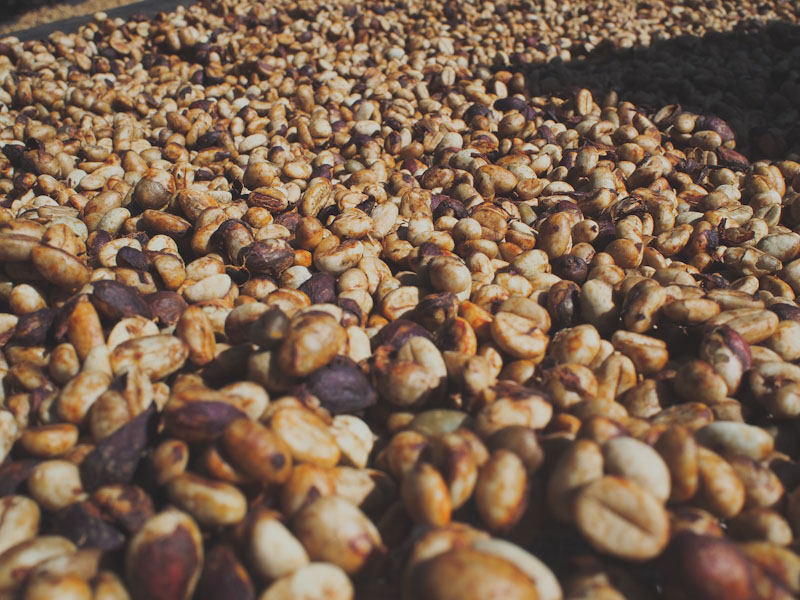HONEY PROCESSED COFFEE
In my previous blog post on Coffee Processing, I described the main different processes of coffee, one of them being the Honey Process. I would like to add a bit more information on the Honey Process as it is becoming a very popular trend in the coffee market.
To revise; there are traditionally two main techniques for processing green coffee beans: natural (or dry) and washed. The honey or ‘pulped natural’ process results from the combination of elements from the above-mentioned processes…to create new differentiations in flavour.
So, what is Honey Processed Coffee?
Pulped natural or the honey process is a method in which the fresh coffee cherries are removed. Some of the flesh inside (the mucilage – the gummy, pasty, substance that surrounds the beans and gives coffee its sweet flavour) is still attached to the coffee bean and the beans are then allowed to dry without washing.
So why is it called honey? As the coffee beans are drying, the sticky coating on the outside (mucilage) oxidizes and darkens in colour. The sweet and sticky mucilage on the beans starts to darken into a golden yellow colour. At this point, the coffee is referred to as yellow honey process coffee.
If the beans undergo further drying time, the coffee continues fermenting, the mucilage further oxidizes to a red and finally a black colour, resulting in the red or black honey process coffee.
The outcome of the type of honey process also depends on the amount of fruit remaining on the beans: the more mucilage on the bean, the darker the colour.
Several factors play a role in the outcome of honey processed coffees such as the drying time, humidity, heat, and the oxidation of sugar.
- White honey tends to be mechanically washed, with minimal mucilage left on the beans, while the yellow honey process is mostly semi-washed with slightly more mucilage on the beans.
- Yellow honey (approx. 25% mucilage) usually has the least cloud or shade cover during drying in order to speed up the drying time to about 8 days.
- Gold honey is dried during warm and sunny times with little humidity to speed up the drying time.
- Red honey (approx. 50% mucilage) takes about 12 days to dry and is typically developed with cloud cover or shading, this is to slow down the drying time which increases the amount of humidity the beans are exposed to. However, it requires less humidity than the black honey coffees.
- Black honey requires more humidity and slower development and is, therefore, covered in more shade than with the red honey process. It is usually 100% covered by mucilage and requires a more extended drying period of about 30 days.
How Does Processing Affect Flavour?
Honey processed coffees tend to be more complex and sweeter than washed processed coffees, but not as fruity as the natural processed coffees. The amount of mucilage on the beans also plays a roll on the final cup of the coffee as more mucilage on the beans results in a fuller-bodied coffee.
Black honey processed coffee make beautiful espressos and really brings forward that honey taste where the white and yellow processed coffees give a very clean taste when prepared as a filter coffee.
There are still many experiments being done with the honey processes. From the amount of fruit left on the bean up to the drying time, and with so many different varieties of beans being processed, we can definitely expect exciting new products in the specialty coffee market.
Sabores is committed to improving the high-end specialty coffee knowledge and availability in South Africa. This is why in 2020, premium Colombian natural and honey-processed coffees from avant-garde farmers will be a vital part of our catalogue.
References
Kilbride, D., 2020. Yellow, Red, & Black Honey Processed Coffees: What’S The Difference? – Perfect Daily Grind. [online] Perfect Daily Grind. Available at: <https://perfectdailygrind.com/2017/02/yellow-red-black-honey-processed-coffees-whats-the-difference/> [Accessed 6 May 2020].
Trianon Coffee. 2020. How Is Honey Processed Coffee Different From Washed Or Natural?. [online] Available at: <https://www.trianoncoffee.com/blogs/news/how-is-honey-processed-coffee-different-from-washed-or-natural> [Accessed 6 May 2020].


Recent Comments